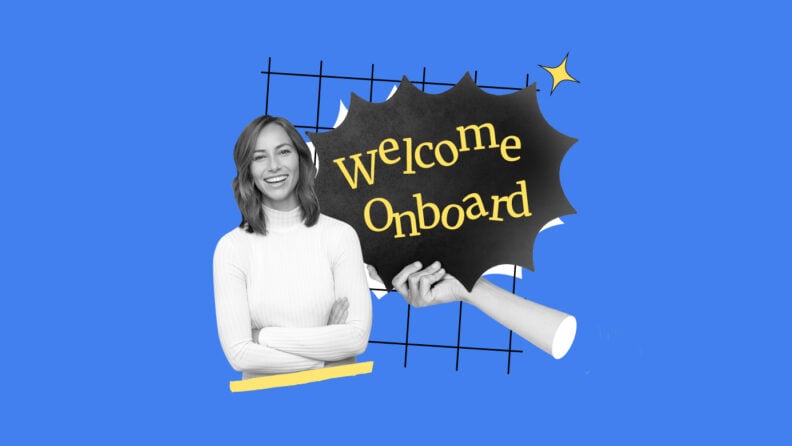Onboarding is a vital yet often overlooked stage in the employee lifecycle and, far too often, new employees and managers aren’t provided the support they need to be effective in their new role.
Considering the vital role managers play in an organization, ensuring newly-hired managers are properly onboarded is a no-brainer.
In this article, I’ll share best practices for successfully onboarding new managers at every level of your organization.
What is Manager Onboarding and Why is it Important?
Manager onboarding is a structured process that helps recently hired or promoted managers become effective in new their roles.
This includes providing them with the necessary tools, resources, information, and support to understand their role and responsibilities, navigate the company culture, and effectively lead their team members to success.
The manager onboarding experience goes beyond general employee orientation and focuses specifically on the unique challenges and expectations that come with a leadership role.
Every new hire should participate in a formal employee onboarding process, and it’s even more important for new managers to have a solid onboarding roadmap.
A formal onboarding plan ensures that new managers receive the necessary information, training, and resources to get up to speed quickly.
What to Include in Manager Onboarding
There are certain elements that need to be covered when onboarding any new employee into your organization, regardless of their seniority. This includes:
- An overview of the organization’s purpose, mission, and core values,
- An explanation of the company structure (including an org chart),
- Introductions to relevant colleagues across the company,
- Training on key tools and processes they'll be using,
- Information regarding corporate goals, strategies, and strategic plans,
- And how their role contributes to the organization’s overall success.
From here the experience will differ depending on role and seniority. This means managers at different levels of your organization will have different needs from their onboarding plans.
To create a successful onboarding plan for managers, start with the new employee onboarding template you use for all your new hires, then adapt it for each individual.
In the sections below, I've outlined the different details you should focus on when onboarding new managers with different levels of seniority across your company.
Onboarding Team Leads & Junior Managers
Team leads and junior-level managers are your greenhorn leaders. While they possess the technical skills, they might lack the necessary leadership and people management skills needed for their new position.
This is why the onboarding plan for less experienced managers should include scheduled check-ins and feedback sessions with more senior managers so they can immerse themselves in the process of providing constructive feedback, coaching, and mentorship. This ongoing support will be vital to help them improve and grow in their new role.
You should also include formal training and learning opportunities to grow and strengthen their leadership and people skills, whether it's something you've developed internally or a new manager course available through another party. (The bonus of internal manager training is that it can be tailored to each new manager's specific needs).
Onboarding Senior Managers
Senior managers and department heads likely have some years of managerial experience, and their onboarding plan can focus more on team development.
In addition to the items mentioned above, an onboarding plan for senior managers needs to provide clarity regarding performance expectations, goals, and key performance indicators (KPIs), not only for their role but for the entire department.
Explain your organization’s performance management process, including performance reviews and feedback mechanisms, and clarify how feedback is given and received within the organization on a daily basis vs the formal annual performance review timeline.
Onboarding Directors & Executives
Directors and executives play a significant role in shaping and reinforcing the company culture. For this reason, their onboarding workflow must include a culture deep dive to help them understand and embody the organization's values and mission.
Directors and executives also need a comprehensive understanding of business initiatives, stakeholders, metrics, and targets, including the ones they will be held accountable for.
Best Practices for Manager Onboarding
To help you and your human resources team create a positive employee experience for your new hires, I've summarized some best practices that can make a big impact.
Create an Onboarding Plan
Common consensus is that it takes around 90 days for someone to get properly up and running in their new role and this can be even longer for more senior positions.
A 30-60-90 day onboarding plan is a useful format to help schedule onboarding tasks, set milestones, and gradually ramp up responsibilities.
The plan should include standardized elements such as due dates for things like benefits enrollment and those tasks that all new employees need to complete (ahem... compliance training!) while providing a framework for customization pertinent to the new starter.
Using specialized onboarding software can also help optimize onboarding processes by making it easier to create personalized onboarding programs and easily track progress.
Offer Resources in Advance
To help managers hit the ground running, it's helpful to provide them with written resources, such as employee handbooks, before their first day. If possible, giving them access to your company intranet to also help new managers digest the company's culture, values, and mission prior to day one.
These resources can be easily distributed in an orientation package with benefit information and company policies, preferably in a digital format to streamline the preparation process and make the package remote-friendly and accessible for all. (Read this article next for other remote-friendly onboarding tips!)
My company sends a welcome kit that includes branded items like a notebook and water bottle, along with a QR code that will take them to the new employee portal where this information is easily navigated.
Another resource to offer ahead of time is industry information, especially if the new manager has a different industry background. This can include things like industry-specific networks and publications they should get acquainted with.
Build Early Team Connections
Introducing a new manager to their team before their official start date can help foster trust, reduce first-day jitters, and pave the way for a smooth transition. It also gives the new manager a chance to create a positive first impression before they officially take over.
Start by providing the incoming manager with key background information about their new team members, such as their roles, key responsibilities, and any notable achievements or projects. This will help the manager gain a clearer understanding of the team dynamics and prepare for meaningful interactions in person.
Additionally, encourage the new manager to reach out and connect with their team members on platforms like LinkedIn. This small action not only begins building rapport but also provides the manager with an opportunity to familiarize themselves with each team member's professional background and interests.
I also recommend scheduling brief virtual introductions or informal meet-and-greet sessions prior to their first day, if possible. If scheduling these in advance doesn't work, these sessions can become part of your onboarding checklist, to be self-scheduled within their first week.
These initial meet-and-greets should be a casual opportunity for team members to welcome the manager, share insights about their work culture, and establish an initial connection, helping everyone feel more comfortable with the transition.
Set Clear Expectations
The expectations for new managers should be clear from the outset, and importantly, they need to be measurable and achievable.
Share the company's current and future strategic goals and initiatives and outline how the manager's role and team aligns with these objectives.
The SMART goal-setting template is my preferred method for goal setting as it requires critical thinking around setting goals that are realistic and achievable.
During their first week, the new manager and their leadership team should work together to develop short and long-term goals.
Provide Ongoing Support
Managers, especially new ones, need ongoing support, and you can help achieve this by pairing them with a mentor who has been a new manager before. This mentorship can bring valuable insight to the new manager in a way that feels collaborative.
Another way to provide ongoing support is to introduce new managers to each other so they can form a cohort. Having this support can help new managers feel welcomed, supported, and engaged.
Take a Culture Deep Dive
Provide an organizational chart that explains the reporting lines, hierarchies, and interdepartmental relationships. This will help the new manager understand how their role fits into the larger picture.
Inform the new manager about any regular company events, traditions, or social gatherings to encourage team bonding, cultural integration, and a sense of belonging.
As an example, my company celebrates Halloween with a costume contest, a pumpkin decorating contest, and an afternoon party. Associates are encouraged to decorate their workspace for the month of October and to dress in costume for the Halloween party.
This celebration has a high level of employee engagement and was the most surprising thing to learn about my company.
Wrapping Up
Manager onboarding directly impacts an organization's success by equipping new leaders with the skills, knowledge, and resources they need to effectively lead their teams, drive performance, and contribute to the company's overall objectives.
Remember, an effective onboarding program should be tailored to the specific needs of the new manager and the organizational culture.
There are a variety of tools that can help you do this, plus onboarding courses you can take to keep developing your skills.
To stay up to date with all the latest developments around employee onboarding, recruiting, HR and leadership, sign up for the People Managing People newsletter. You'll get the latest articles, insights, podcasts and more, straight to your inbox.




